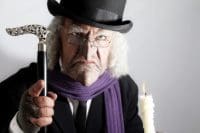 As most people do, during the Christmas season, I sat down with my family and watched a Christmas Carol this past weekend. Despite the fact that I have heard the tale of Ebenezer Scrooge dozens of times before, for some reason, this year my interpretation of how Charles Dickens characterized Scrooge, was slightly different than it has been for me in the past.
As most people do, during the Christmas season, I sat down with my family and watched a Christmas Carol this past weekend. Despite the fact that I have heard the tale of Ebenezer Scrooge dozens of times before, for some reason, this year my interpretation of how Charles Dickens characterized Scrooge, was slightly different than it has been for me in the past.
Don’t get me wrong, I still saw Scrooge as an uncaring, bitter, mean person who did nothing to exemplify the Christmas spirit. But some of the other qualities I might have attributed to Scrooge like dishonesty, greed and selfishness I started to question. I’ve always kind of took for granted that Scrooge was simply born an evil person who hurt as many people as he could in order to better himself. But as I really analyzed his actions as described in the story, I found he was far more complex than that. What I actually see is a sad, insecure, regretful, individual who used his natural business acumen as a replacement for the things in his life that he lacked. Before you label me a “Bah Humbug” allow me to lay out my case. In the story is he ever described as someone who stole or cheated people? Did he live an extravagant life off the proceeds of those immoral business practices? The answer to both questions is no. I would argue Scrooge is a tragic hero, and the lessons we can learn from him are far greater than just to love Christmas.
I believe the real lesson to take away from the Christmas Carol is the fear of not being enough, and not having enough are extremely powerful, and if you allow those fears to control you, you too might find yourself displaying some of the villainous characteristics Ebenezer showed. Think about it, we learn when Scrooge is visited by the ghost of Christmas’ past, that he was not always the miser he later became. As a young man we see his desire to love and to be loved by others. I would argue that as a result of the rejection he felt from his parents, he grew up with a feeling that he could never be good enough, and that this lack of self‐worth caused him to feel like he could never have enough to be the provider he wanted to be for his future wife, and as a result lost her as well.
I don’t think there are many of us who have not struggled with these same basic fears of not having, or being enough. But I also know that when we attempt to use wealth or status to curb this fear, the result is never what we’d like it to be. I saw this first hand with my own grandfather, who in his later years fell into an obsession with the size of his bank account. He became so fearful of losing the wealth he had acquired that the last several years of his life were not particularly happy ones. And when he passed away the legacy he left, although financially substantial, was not all that it could have been. Fortunately for Scrooge, he learns this valuable lesson before it’s too late. He is able to finally see that people are what really matter, everything else just becomes dust.
In Timothy, the apostle Paul makes very clear, that although money can be a powerful tool for good, the love of it, is the root of all evil. If you are feeling like your love of money, or your fear of not having enough of it, is affecting the relationships in your life, I would challenge you to use this holiday season to make an effort to change your focus. Do specific things to strengthen or rebuild relationships in your life.
If you do, you too might rediscover the true meaning of Christmas, without the need of spirits visiting you.
